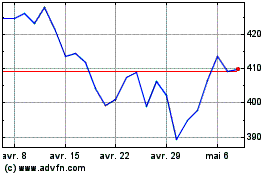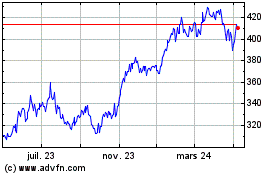Microsoft's Challenge of Amazon in the Cloud Gains Force
27 Octobre 2019 - 10:03PM
Dow Jones News
By Aaron Tilley
Microsoft Corp.'s win of a landmark Pentagon cloud-computing
contract adds force to the software company's effort to unseat
Amazon.com Inc. as the undisputed leader in the multibillion-dollar
cloud-computing market.
For both of the tech giants, providing cloud-computing services
-- where customers rent some of their large computing horsepower
rather than investing in their own -- has become a key profit
driver and one of the most closely watched growth areas by
investors.
Amazon was a pioneer in the cloud business, propelling it to a
dominant market position. But Microsoft CEO Satya Nadella also has
bet heavily on the cloud, spurring strong growth for the Redmond,
Wash., company.
On Friday, the Pentagon awarded Microsoft the Joint Enterprise
Defense Infrastructure, or JEDI, contract that could be worth up to
$10 billion over the next decade. Amazon, which already provides
cloud services to the Central Intelligence Agency, was widely seen
as the front-runner. Microsoft's win is one of the most public
examples, to date, showing that it poses a serious threat to
Amazon's dominance.
The award came the same week Microsoft and Amazon reported
earnings that signal the competitive dynamics in the cloud are
changing. Microsoft said sales for its Azure cloud business grew
59% in the quarter compared with the year prior. For Amazon Web
Services, or AWS, quarterly sales grew 34.7% from a year earlier --
a significant slowdown from the past -- helping spur a sharp drop
in its share value.
Microsoft isn't the only tech giant trying to challenge Amazon's
cloud position. Alphabet Inc.'s Google has been ramping up its
efforts. It last year hired Thomas Kurian to run its cloud business
from Oracle Corp., another cloud competitor with big ambitions.
International Business Machines Corp. also has prioritized cloud
growth. It splashed out $34 billion to buy open-source software
giant Red Hat Inc. to strengthen its hand.
AWS sales are still far larger than Microsoft's Azure revenue or
any of the other rivals, according to reported figures and analysts
estimates, but the gap is narrowing. Amazon had 31.5% of the cloud
market share in the previous quarter compared with Microsoft with
an 18.1% slice, according to analysis firm Canalys. But that gap is
more than 3 percentage points narrower than it was a year prior as
the total market grew around 37%, Canalys data shows.
The JEDI deal brings Microsoft another step closer to contesting
Amazon's position as the world's largest public cloud vendor, said
Holger Mueller, principal analyst at Constellation Research
Inc.
"This might help Microsoft overtake Amazon to become the No. 1
cloud vendor," Mr. Mueller said.
Microsoft last week also secured a deal with German software
giant SAP SE that makes Azure the preferred cloud for the European
tech company's customers.
The JEDI contract, which Stifel Nicolaus analyst Brad Reback
said could eventually boost annual Microsoft free cash flow by $300
million, is one of several to deepen Microsoft's ties to the
Pentagon.
Microsoft late last year won a $480 million contract to supply
100,000 HoloLens augmented reality glasses to the U.S. Army. It
beat out well-funded augmented reality startup Magic Leap. The U.S.
government in August also awarded a 10-year $7.6 billion Pentagon
contract award to General Dynamics Corp. that includes replacing
existing IT systems with Microsoft's Office 365.
The JEDI loss is a blow to Amazon's goal of making government
contracts a larger portion of the business for its cloud division.
Amazon last year said it was setting up a second headquarters in
Northern Virginia, known as HQ2, in part to house its expanding
government-linked operations.
Amazon, in a statement Friday, said it was surprised by the
Pentagon's choice. It can contest the outcome but hasn't said if it
would.
Microsoft's president for U.S. regulated industries, Toni
Townes-Whitley, said Saturday that "we brought our best efforts to
the rigorous JEDI evaluation process and appreciate that DoD has
chosen Microsoft."
Amazon also faces the prospect of competition for its cloud work
for U.S. spy agencies. The intelligence community, in a new plan
published in June, said it wanted to "promote innovation and
competition" by using multiple vendors.
The JEDI loss, if its stands, doesn't mean the Pentagon's doors
are shut to Amazon. While the military had drawn criticism for
planning to select a single contractor for the megadeal even before
Microsoft was named the winner, Pentagon officials pushed back
against those claims, countering that the Defense Department would
still have multiple cloud contracts beyond JEDI. The Defense
Department has said it has several hundred separate clouds and JEDI
would merely serve as an umbrella system.
Even as it announced the Microsoft award, the Pentagon, in a
statement Friday, said "additional contracting opportunities are
anticipated."
Write to Aaron Tilley at aaron.tilley@wsj.com
(END) Dow Jones Newswires
October 27, 2019 16:48 ET (20:48 GMT)
Copyright (c) 2019 Dow Jones & Company, Inc.
Microsoft (NASDAQ:MSFT)
Graphique Historique de l'Action
De Mar 2024 à Avr 2024

Microsoft (NASDAQ:MSFT)
Graphique Historique de l'Action
De Avr 2023 à Avr 2024
